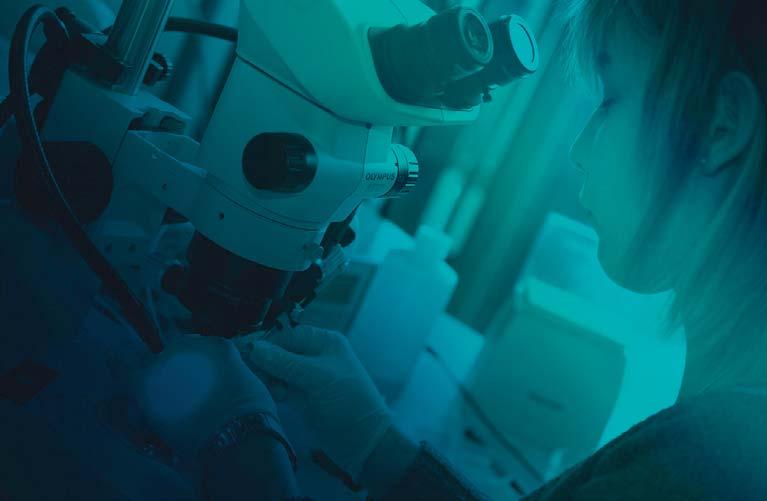GIGA - Interdisciplinary Research Institute in Biomedical Sciences of the University of Liège Cutting-edge technological platforms at the service of the biomedical sector The aim of GIGA’s technological platforms is to meet the needs of the biomedical sector by providing high quality technological support and cutting-edge expertise in research and industrial and academic innovation (from fundamental to preclinical and clinical).
T
he ability to explore the genome (DNA), transcriptome (RNA) and proteome (proteins) of different organisms, analyse the data generated through systematic analysis thanks to bioinformatics and replace it in a cellular or organismic context seems indispensable for all research projects or businesses active in the field of biopharmaceuticals or biotechnologies. This is also true of research conducted in the food industry and materials sector.
© GIGA
Access to exceptional technological equipment for research and innovation is becoming difficult - especially for SMEs - due to the implementation cost and increasing levels of expertise they require. The GIGA's technological platforms group together cutting-edge technologies and top-of-the-range skills. They can be accessed by researchers in all sectors (both academic and private).
The first operational 7 Tesla MRI scanner in Belgium, an ultra-high magnetic field imaging device, was installed at the Cyclotron-In Vivo Imaging GIGA Research Centre at the University of Liège in September 2019.
Daily interaction with the research units makes it possible to adapt the services on offer to the demands of researchers and to keep pace with scientific and technical progress. The advantages of this approach are many. It guarantees equipment that is always at the cutting edge of technology, it offers a local, accessible service to the academic world and local businesses at an optimal cost and provides analyses carried out by experts in the field.
The new 7 Tesla MRI scanner will initially be dedicated to neuroimaging research. The level of infra-millimetric resolution of the brain structure and the ability to detect with incredible precision the variations in the brain’s activity will allow several of the GIGA’s scientific teams to continue their work in the field of neuroscience and neurodegenerative diseases. “In order to gain more in-depth knowledge of brain physiology and pathologies and further develop our research on cognitive neuroscience, we need to be able to study increasingly small structures and nerve cells”, explains Dr Éric Salmon, director of the Cyclotron-In Vivo Imaging GIGA Research Centre.
The GIGA's technological platforms The GIGA provides services in the following fields: - Genomics - In vitro Imaging (via Cell Imaging and Flow Cytometry) - In vivo Imaging (via the Cyclotron CRC platform) - Immunohistology - Viral Vectors - Proteomics - Animal Facilities (Mouse and Zebrafish).
The 7 Tesla MRI MAGNETOM Terra, developed by Siemens Healthineers, is able to produce images of the living human brain at a very high isotropic spatial resolution up to 0.2 mm. This MRI scanner will first and foremost help researchers to more quickly identify new neurodegenerative pathology biomarkers, achieve a better understanding of sleep, list the metabolic processes of the brain and visualise neurodegenerative diseases.
Exceptional equipment
The NovaSeq6000 sequencer In genomics, the platform now has a new generation sequencer, the NovaSeq 6000 Illumina, which it purchased this year with ERDF funding.
The 7 Tesla MRI Among the exceptional equipment that the GIGA has, we should mention the first 7 Tesla MRI scanner operational in Belgium. This ultra-high magnetic field imaging device has been installed at the Cyclotron-In Vivo Imaging GIGA Research Centre at the University of Liège since September. Thanks to this state-of-the-art technology, researchers will be better able to understand the cerebral physiology and pathology of neurological diseases such as Alzheimer’s, epilepsy, Parkinson's and multiple sclerosis.
The NovaSeq6000 is a cutting-edge, ultra-high-speed sequencer with the necessary capacity to routinely sequence entire (human) genomes. It is possible to analyse 48 human genomes in two days, which allows for accurate and personalised medicine. 130

















































































































